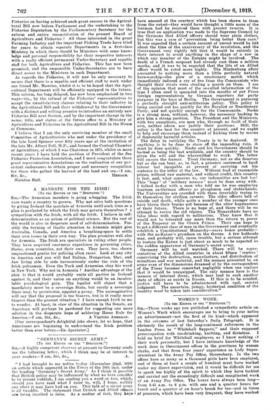" GERMANY'S SECRET ARMY."
[To THE EDITOR OF THE " SPECTATOR."]
Sia,—A highly competent observer at present in Germany sends me the following letter, which I think may be of interest to " I had brought to my notice to-day (November 22nd, 1919) an article which appeared in the Times of the 19th inst. under the heading `Germany's Secret Army.' As I think it possible that British policy may be influenced by what we here consider to be arrant rubbish, I am sending you a word or two, which, should you have read what I refer to, will, I hope, nullify any effect it may have had on you. This talk of a secret army is all twaddle. The statement that British and Allied officers are being insulted is false. As a matter of fact, they hays been amazed at the courtesy which has been shown to them from the outset—they would have thought a little more of the German had he received them with greater reserve. It is true that an application was made to the Supreme Council by the Germans that Allied officers should wear plain clothes, but this was a case of ' prevention being better than cure!
It was expected that a certain amount of unrest would be felt about the time of the anniversary of the revolution, and the Government very rightly felt that it would be entirely in their interest to avoid anything in the shape of a row in which any member of the Entente might be involved. The death of a French sergeant had already cost them a million marks, and it was to be expected that the life of an Allied officer would be rated more highly. The Hindenburg affair amounted to nothing more than a little perfectly natural hero-worship—the glow of a reactionary match which immediately induced a cry of fire from the Communists who thought their rivals were stealing a march on them. I am of the opinion that most of the so-called information of the type I often read is spoon-fed into the mouths of our Press foreign representatives by German reporters for party purposes in the bars of Berlin. The Government is pursuing a perfectly straight anti-militarism policy. This policy is being carried out too quickly for the Royalist or Reactionary Party, and not quickly enough for the Communists. Noske is a strong man, without however, the necessary backing to give him a strong position. The President and the Ministers, with two exceptions, are men who, through no fault of their own, neither adorn nor justify their positions. Still, the policy is the best for the country at present, and we ought to help and encourage them instead of kicking them by means of deplorably harmful articles.
The delay in ratifying the Treaty is to be deplored. If anything is to be done to stave off the impending ruin, it must be done quickly. Noske and his Government should be backed as being the best available, and the country should be given the will and the wherewithal to work. The latter will ensure the former. Treat Germany, not as she deserves but as she can bear, as, in fact, a prisoner sentenced to hard labour but incapable at present of carrying out his sentence to the letter of the law. Without food at reasonable prices, without raw material, and without credit, this country is lost, and, what concerns us, our indemnities are lost tuo! This ' bogy' of ' military menace' must be done away with. I talked to-day with a man who told me he was employing fourteen ex-German officers as ploughmen and stable-hands. The Universities are crowded with them feverishly trying to fit themselves for civilian careers. The older officers talk of suicide and death, while quite a number of the younger ones have blown their brains out because of the utter hopelessness of their future. There is no hope of, and there will be no attempt to revive the old regime. The Monarchists have no false ideas with regard to militarism. They know that it would not be tolerated any more than the return to power of the Emperor or the Crown Prince. Their one hope is to get a different class of men in the Government and eventually establish a Constitutional Monarchy—years hence probably— with the ex-Kaiser's grandson on the throne. A few hotheads may, and probably will, cause trouble, but a serious attempt to restore the Kaiser is just about as much to be expected as the sudden appearance of Germany's secret army.
Germany will be well watched. There will be repre- sentatives of the Allied countries in about fifteen ' centres ' supervising the destruction, manufacture, and distribution of munitions and war material, and the menace presented by an army even of the dimensions dreamed of by the correspondent. of the Times becomes somewhat negligible when one realizes that it would be unequipped. The only menace here is the menace of internal decay, which may lead to such another state of affairs as exists in Russia. if this is to be avoided, justice will have to be administered with cool, careful judgment. The uncertain, jumpy, hysterical condition of the country must be taken into consideration."














































 Previous page
Previous page